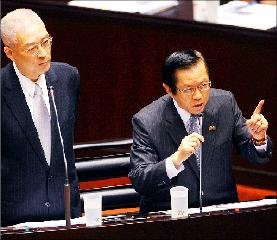Minister of Foreign Affairs Timothy Yang (楊進添) yesterday sent a letter to former Philippine senator Manuel Roxas II saying the government had lifted all the recent restrictions imposed on Filipinos seeking employment in Taiwan, effective immediately.
Roxas visited Taiwan twice in his capacity as the emissary of Philippine President Benigno Aquino III to resolve the diplomatic row between the two nations that arose from the deportation by the -Philippines of 14 Taiwanese fraud suspects to China on Feb. 2
Last Wednesday, the ministry announced relaxations to its visa application requirements for Filipino workers, which was one of the measures adopted by Taipei on Feb. 8 in retaliation for the refusal by Manila to offer an apology for the deportation. Later, Manila removed two officials from the Philippine Bureau of Immigration, which was regarded by Taipei as a form of apology.

Photo: Lin Cheng-kung, Taipei Times
The move by Manila included the replacement of former chief of the Bureau of Immigration Ronaldo Ledesma with Ricardo David Jr, former Armed Forces of the Philippines chief, in addition to the removal of Faizal Hussin from his post as head of the bureau’s Intelligence Division.
However, Philippine presidential spokesperson Edwin Lacierda said the appointment of the former armed forces chief was not meant to appease Taiwan.
The Ministry of Foreign Affairs yesterday removed additional measures that extend the process of screening Philippine work visa applications from the previous 12 days to up to four months and restored the ability for certain Philippine tourists to apply for a visa online.
“To express our good faith in response to your visits and the most recent measures taken by your government, we are lifting the restrictions on visa applications for all Philippine workers, effective immediately, and will resume the method used to process their work permits prior to Feb. 7,” Yang wrote in the letter to Roxas.
In a statement released yesterday, the ministry said the punishment of the two immigration officials “met the expectations of Taiwan.”
The Council of Labor Affairs said it would adopt measures to effectively lift the ban on migrant workers from the Philippines, effective immediately.
The council said it had been instructed by the ministry to once again open the nation’s doors to Philippine workers.
Another measure which has been abolished was requiring that Philippine citizens submit their social security system card as part of their application to work in Taiwan, a move that amounted to freeze a on hiring Philippine workers, because Manila stopped issuing the card a long time ago.
The initial measures had been met by criticism from several migrant and international worker associations, who said that Philippine migrant workers and their employers were innocent and that punishing them for Manila’s actions was unreasonable and a violation of their rights.

CARROT AND STICK: While unrelenting in its military threats, China attracted nearly 40,000 Taiwanese to over 400 business events last year Nearly 40,000 Taiwanese last year joined industry events in China, such as conferences and trade fairs, supported by the Chinese government, a study showed yesterday, as Beijing ramps up a charm offensive toward Taipei alongside military pressure. China has long taken a carrot-and-stick approach to Taiwan, threatening it with the prospect of military action while reaching out to those it believes are amenable to Beijing’s point of view. Taiwanese security officials are wary of what they see as Beijing’s influence campaigns to sway public opinion after Taipei and Beijing gradually resumed travel links halted by the COVID-19 pandemic, but the scale of

TRADE: A mandatory declaration of origin for manufactured goods bound for the US is to take effect on May 7 to block China from exploiting Taiwan’s trade channels All products manufactured in Taiwan and exported to the US must include a signed declaration of origin starting on May 7, the Bureau of Foreign Trade announced yesterday. US President Donald Trump on April 2 imposed a 32 percent tariff on imports from Taiwan, but one week later announced a 90-day pause on its implementation. However, a universal 10 percent tariff was immediately applied to most imports from around the world. On April 12, the Trump administration further exempted computers, smartphones and semiconductors from the new tariffs. In response, President William Lai’s (賴清德) administration has introduced a series of countermeasures to support affected

Pope Francis is be laid to rest on Saturday after lying in state for three days in St Peter’s Basilica, where the faithful are expected to flock to pay their respects to history’s first Latin American pontiff. The cardinals met yesterday in the Vatican’s synod hall to chart the next steps before a conclave begins to choose Francis’ successor, as condolences poured in from around the world. According to current norms, the conclave must begin between May 5 and 10. The cardinals set the funeral for Saturday at 10am in St Peter’s Square, to be celebrated by the dean of the College

CROSS-STRAIT: The vast majority of Taiwanese support maintaining the ‘status quo,’ while concern is rising about Beijing’s influence operations More than eight out of 10 Taiwanese reject Beijing’s “one country, two systems” framework for cross-strait relations, according to a survey released by the Mainland Affairs Council (MAC) on Thursday. The MAC’s latest quarterly survey found that 84.4 percent of respondents opposed Beijing’s “one country, two systems” formula for handling cross-strait relations — a figure consistent with past polling. Over the past three years, opposition to the framework has remained high, ranging from a low of 83.6 percent in April 2023 to a peak of 89.6 percent in April last year. In the most recent poll, 82.5 percent also rejected China’s